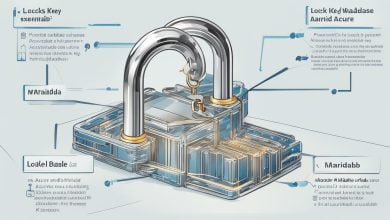
What is Azure Cosmos DB?
Azure Cosmos DB is a NoSQL database that is designed to handle massive amounts of data on a global scale. It is a schema-free database, which means you can store data in any format without having to define a schema beforehand. This flexibility makes it incredibly easy to model and modify your data without any constraints.
With Azure Cosmos DB, you can easily distribute your data across multiple regions for improved performance and availability. This allows you to reach users all around the world seamlessly, making it a perfect solution for global applications.
Distributed Database Management
One of the standout features of Azure Cosmos DB is its ability to manage distributed databases. With Azure Cosmos DB, you can distribute your data across multiple regions, enabling you to provide faster access to your users regardless of their location. This is especially useful for global companies.
Azure Cosmos DB’s distributed database management also ensures high availability. By replicating your data synchronously across multiple regions and data centers, Azure Cosmos DB provides an extremely reliable and durable data store. Even if one region fails, your data remains safe and accessible.
Additionally, Azure Cosmos DB’s distributed database management is highly scalable. With just a few clicks, you can add or remove regions to meet changing demands of your users. As your user base grows, Azure Cosmos DB’s distributed database management allows you to keep up with increasing workloads without any extra effort on your part.
Handling Multiple Data Models with Azure Cosmos DB
Azure Cosmos DB is a versatile multi-model database that is schema-free. This means that it can handle multiple data models, including document, key-value, graph, and columnar.
This multi-model capability allows Azure Cosmos DB to support different types of data, from simple key-value pairs to complex graphs. Developers can choose the best model that fits their needs, without having to conform to a rigid data schema. This flexibility enables faster development and improved time-to-market for applications.
Furthermore, the schema-free nature of Azure Cosmos DB makes it easy to adapt to changing data requirements. You can add, remove, or modify fields without having to worry about the impact on other parts of the database schema. This makes it ideal for agile development methodologies that require continuous integration and deployment.
The Benefits of a Multi-Model Database
A multi-model database like Azure Cosmos DB can provide several benefits compared to a traditional single-model database. For example, with a multi-model database, you can:
- Handle different types of data using a single database
- Minimize data duplication and reduce storage costs
- Improve application performance by selecting the most appropriate data model
Additionally, the multi-model capability of Azure Cosmos DB can help simplify development and reduce maintenance costs. By using a single database that supports multiple models, you can avoid the need to set up and manage multiple databases for different types of data. This can save time and resources for your development teams and reduce the risk of errors or inconsistencies between databases.
In summary, the multi-model and schema-free capabilities of Azure Cosmos DB enable developers to build flexible and adaptable applications that can handle different types of data with ease. This can help reduce development and maintenance costs, improve time-to-market, and optimize application performance.
Going Serverless with Azure Cosmos DB
One of the key advantages of Azure Cosmos DB is its serverless functionality, which enables you to scale your applications dynamically without worrying about managing infrastructure. With serverless computing, you only pay for the resources you consume, making it a cost-effective solution for handling variable workloads.
Azure Cosmos DB’s serverless capabilities let you focus on developing your application rather than managing your database. You do not have to worry about provisioning, configuring, or maintaining any infrastructure. Azure Cosmos DB automatically takes care of scaling and performance optimization for you.
By utilizing Azure Cosmos DB’s serverless features, you can build highly responsive applications that can handle massive amounts of data without any upfront investment in infrastructure. Whether you are developing a new application or extending an existing one, Azure Cosmos DB’s serverless computing can help you accelerate your development cycle and reduce your operational costs.
Ensuring Reliability and Scalability with Azure Cosmos DB
One of the key advantages of Azure Cosmos DB is its ability to provide enterprise-grade reliability and scalability. With automatic and transparent replication, your data is always highly available and durable. This means that even in the event of a regional outage or disaster, your data is protected and accessible.
Azure Cosmos DB is also highly scalable, allowing you to handle increasing workloads without any negative impact on performance. You can easily scale throughput, storage, and compute resources as needed, ensuring your applications can handle any demand.
By choosing Azure Cosmos DB as your database management solution, you can rest assured that your data is always protected and available, and your applications can handle the highest workloads.
Optimizing Your Azure Cosmos DB Deployment
Managing your Azure Cosmos DB deployment can be a daunting task, but with the right best practices, you can ensure optimal performance and scalability. Here are some tips to help you get the most out of your Azure Cosmos DB.
Indexing Strategies
Indexes are essential for efficient data retrieval. However, their overuse can lead to performance degradation. It is advisable to create indexes that are specific to your query patterns and avoid creating redundant ones. Additionally, disabling unnecessary indexing can help improve write performance.
Partitioning
Partitioning is crucial to ensuring high scalability in Azure Cosmos DB. It allows you to distribute your data across multiple physical partitions for improved performance. When partitioning, it is essential to choose a partition key that offers high cardinality to avoid partition hotspots and distribute data evenly.
Performance Optimization Techniques
Optimizing performance in Azure Cosmos DB involves tuning various parameters, such as request units, consistency levels, and connection policies. Increasing request units and using strong consistency levels can improve read and write performance, while decreasing consistency levels can improve availability and performance. Additionally, using direct connectivity, connection pooling, and caching can reduce latency and improve performance.
Monitoring and Troubleshooting
Regular monitoring and troubleshooting can help you identify and resolve issues that impact the performance and availability of your Azure Cosmos DB instance. Monitoring tools, such as Azure Monitor and Azure Log Analytics, can help you monitor Azure Cosmos DB metrics and diagnose issues. Additionally, leveraging Azure Cosmos DB’s global distribution feature can help you ensure high availability and disaster recovery.
By following these best practices, you can optimize your Azure Cosmos DB and ensure optimal performance and scalability. With proper management, Azure Cosmos DB can be a powerful asset in your cloud application database management.
Conclusion
As we wrap up this article, it’s clear that Azure Cosmos DB is a powerful tool in the world of cloud technology and database management. Its ability to handle massive amounts of data at a global scale, support for multiple data models, and serverless architecture make it an ideal solution for modern-day data storage and retrieval needs.
With its enterprise-grade reliability and scalability, Azure Cosmos DB ensures seamless data management and availability. By following best practices and optimizing your deployment, you can further improve performance and efficiency.
Incorporating Azure Cosmos DB into your cloud applications can help simplify database management while also providing optimal data storage and retrieval. We encourage you to explore the capabilities of Azure Cosmos DB and harness its power for your own cloud-based projects.
FAQ
Q: What is Azure Cosmos DB?
A: Azure Cosmos DB is a NoSQL database that can handle massive amounts of data at a global scale. It is schema-free, allowing for flexible data modeling.
Q: What is distributed database management in Azure Cosmos DB?
A: Azure Cosmos DB supports distributed database management, which means you can distribute your data across multiple regions for improved performance and availability. It also has global scale capabilities, allowing you to reach users worldwide seamlessly.
Q: Can Azure Cosmos DB handle multiple data models?
A: Yes, Azure Cosmos DB supports multiple data models, including document, key-value, graph, and columnar data models. It is designed to be flexible and adapt to changing data requirements.
Q: How does Azure Cosmos DB enable serverless computing?
A: Azure Cosmos DB offers serverless functionality where you can scale your applications dynamically and only pay for the resources you consume. This serverless architecture provides cost-effectiveness and flexibility in managing your database.
Q: Is Azure Cosmos DB reliable and scalable?
A: Yes, Azure Cosmos DB is enterprise-grade and highly available. It employs automatic and transparent replication to ensure the reliability and durability of your data. It also has impressive scalability capabilities to handle increasing workloads.
Q: Are there any best practices for optimizing Azure Cosmos DB deployment?
A: Yes, there are several best practices for optimizing your Azure Cosmos DB deployment. These include implementing indexing strategies, partitioning techniques, and performance optimization. Monitoring and troubleshooting approaches are also important for maximizing performance.
Q: In conclusion, what are the key benefits of Azure Cosmos DB?
A: Azure Cosmos DB simplifies database management in the cloud and offers advanced features for data storage and retrieval. Its global scale, multi-model support, reliability, and scalability make it an excellent choice for cloud applications.







